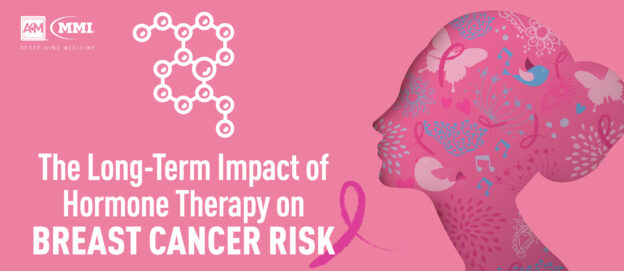For several decades, hormone therapy and its risk-to-benefit ratio have been a controversial topic within the scientific community. First published in 2002, reports from the Women’s Health Initiative (WHI) presented data on the complicated benefits and potential adverse events associated with menopausal hormone therapy. Prior to this, estrogen therapy was put into question due to its association with an increased risk of endometrial hyperplasia and cancer, however, it subsequently rose to popularity again following the discovery that the addition of progesterone was able to minimize the associated risks.
At the moment, the influence of menopausal hormone therapy on breast cancer risk remains undetermined as findings from observational studies and randomized clinical trials have been varied. In addition, earlier reports were not based on long-term data and therefore did not allow the assessment of whether these trends persist over time and if they translate into an impact on the risk for death from breast cancer.
To investigate these questions, a team of researchers recently conducted a study, with results published in JAMA, which revealed the association between hormone therapy and incident and fatal breast cancer after long-term follow-up of over 20 years.
Association of Hormone Therapy with Breast Cancer
Led by Rowan T. Chlebowski, MD, PhD, a team of researchers set out to assess the association of prior randomized estrogen plus progestin use as well as that of estrogen use alone with the incidence and mortality rate of breast cancer based on data derived from the Women’s Health Initiative clinical trials.
Data from 2 placebo-controlled randomized clinical trials with a long-term follow-up period of over 20 years were included; these involved over 27,300 postmenopausal women with no prior breast cancer and negative baseline screening mammogram results. The primary outcome measured was breast cancer incidence; secondary outcomes were rates of deaths from breast cancer and mortality rates after breast cancer.
In one trial, 16,608 women with a uterus were split into two cohorts: one was randomized to receive 0.625 mg/d of conjugated equine estrogen plus 2.5 m/g of medroxyprogesterone acetate, the other to a placebo treatment. The second trial involved 10,739 women with prior hysterectomy of which 5310 were randomized to receive 0.625 mg/d of conjugated equine estrogen alone and 5429 were given a placebo treatment. The trials were stopped after 5.6 and 7.2 years of median intervention duration, respectively.
Benefits of Estrogen Use, Risk Associated with EPT
Dr. Chlebowski and his colleagues report that estrogen use alone reduced the incidence of as well as mortality from breast cancer, while combination estrogen-progestin therapy (EPT) was found to elevate breast cancer incidence but not mortality from.
The long-term follow-up found that prior randomized use of conjugated equine estrogen among women with prior hysterectomy was significantly associated with a decreased risk of breast cancer and breast cancer mortality compared with placebo. Conversely, prior randomized use of estrogen with medroxyprogesterone acetate was associated with a significantly higher risk of breast cancer incidence – but not breast cancer mortality – among participants with an intact uterus compared to placebo.
Researchers reported that in the trial of women with prior hysterectomy, 238 instances of breast cancer were diagnosed compared with 296 cases in the placebo group and 30 deaths occurred versus 46 in the placebo cohort. In the other trial of women with an intact uterus, the estrogen-progestin therapy group reported 584 cases of breast cancer compared with 447 cases in the placebo cohort. Mortality rates were the same between groups, 71 and 53 deaths respectively.
While the topic of hormone therapies risks and benefits continues to be contested, the latest findings indicate that breast cancer mortality benefit may be associated with conjugated equine estrogen use, potentially signaling a novel risk-reduction approach for select high-risk female patients who have undergone hysterectomy. Furthermore, the results also indicate the need for cautious administration of estrogen-progestin therapies in women with a high risk for breast cancer as well as the call for further investigation.

